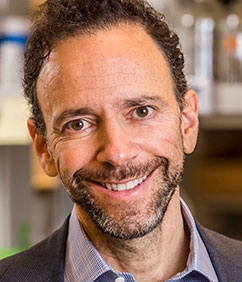Jeffrey Wolf ’88 builds cutting-edge biotech companies from the ground up
Jeffrey Wolf ’88 started his career as an entrepreneur while attending NYU Law. “I knew from a young age that I wanted to start cool companies,” says Wolf, who as a 1L launched National Coverletter, a service that aimed to make it easier for law students to apply to a large number of firms without having to replicate redundant documents.
Since then, Wolf has founded multiple companies, and, most recently, Heat Biologics, a NASDAQ-traded biopharmaceutical company based in Research Triangle Park, North Carolina, where he is the founder, chairman, and CEO. Focused on activating the immune system to fight cancer and other diseases, Heat Biologics announced in April that it had begun work on a vaccine against COVID-19.
“I figured a law degree would give me the foundation to start new companies,” Wolf says, noting that his JD also gave him confidence in his ability to lead. His time at NYU Law, including his work with National Coverletter, helped him understand how to build a company from scratch, he adds. During his three years of law school, he expanded the company from a customer base of NYU students to students nationwide before shelving the business to enter an MBA program at Stanford University. Wolf, the first in his family to attend college, credits an eclectic childhood spent travelling the country—his father was a salesman and auctioneer at carnivals—with developing an openness to new ideas that has helped him to see the potential in a range of ventures.
Today, Wolf specializes in building biotech companies from the ground up. In 1998, he created Seed-One Ventures, a seed-stage venture capital firm focused on starting and running new companies based on scientific breakthroughs. Through Seed-One, Wolf founded and led companies such as Heat Biologics, Elusys Therapeutics, which develops monoclonal antibodies to treat anthrax exposure, and TyRx, which focused on the development of biodegradable polymers for use in numerous medical application. In 2016, TyRx was sold to Medtronic, a large medical device company, for $160 million.
“When I start a company, it has to conform to a certain paradigm,” says Wolf, who regularly visits university and military laboratories, looking for compelling medical technologies. “I look for maverick research, I look for proof of concept, for strong intellectual property,” Wolf says, technologies “that can really have an impact.”
Wolf says that his law degree has aided him as an entrepreneur: “Law always comes into play,” he says, especially when negotiating an agreement, reviewing a license, or running a public company. Wolf says his law degree also confers credibility and allows him to bring a different and important knowledge base to his discussions with the scientists at work on new technologies.
His interest in biotech developed when he worked at the Castle Group, a biomedical venture capital fund in New York, after business school. “The Castle Group was a unique place. Instead of investing in new ventures, it built entire companies around scientific breakthroughs. We developed the company and the narrative, which really excited me,” says Wolf, who follows this model in forming his own ventures. After five years at Castle Group, Wolf left to start his own companies.
“Jeff is an amazing strategist; he has an uncanny ability to figure out what is truly innovative, and then he goes after it,” says John Prendergast, a molecular biologist who worked with Wolf at the Castle Group and now serves on the board of Heat Biologics, Wolf’s latest venture. “There are not too many people like him, who haven’t trained as a scientist and yet are able to have a preeminent and visionary sense about what can really create change in a market,” Prendergast says.
At Heat Biologics, Wolf and his team are developing a groundbreaking vaccine platform designed to stimulate T-cell production to fight cancer and infectious diseases. In April, Heat announced that it was creating a vaccine against COVID-19 using this platform.
“Our platform has been used to address Zika, malaria, and HIV, but none of them represented the kind of pandemic we are facing now,” Wolf says.
“I love science and the amazing changes it’s capable of making—how it can impact people’s lives,” Wolf adds. “I know that I have the facility to bring people together and start things up, so it’s for me a matter of using my skills to give great science the boost it needs to make the changes it’s capable of making.”
Posted June 9, 2020


